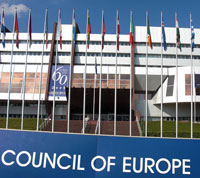 What can universities do to integrate foreign students interculturally? The Council of Europe’s White Paper on Intercultural Dialogue demands that “Higher-education institutions play an important role in fostering intercultural dialogue, through their education programmes, as actors in broader society and as sites where intercultural dialogue is put into practice”. So, let us look at how this political demand is put into practice by talking to both, students and experienced professionals who are responsible for integrating foreign students in universities.
What can universities do to integrate foreign students interculturally? The Council of Europe’s White Paper on Intercultural Dialogue demands that “Higher-education institutions play an important role in fostering intercultural dialogue, through their education programmes, as actors in broader society and as sites where intercultural dialogue is put into practice”. So, let us look at how this political demand is put into practice by talking to both, students and experienced professionals who are responsible for integrating foreign students in universities.
absolutely welcome
The Steering Committee on Higher Education and Research suggests, that “the university is ideally defined precisely by its universality – its commitment to open-mindedness and openness to the world, founded on enlightenment values. The university thus has great potential to engender ‘intercultural intellectuals’ who can play an active role in the public sphere”.
So let us do a reality check and find out how this open-mindedness and openness of the universities is put into practice in real life. Which methods are used to integrate incoming students in the daily academic life in the foreign country? I spoke with Adelheid Korpp, who is responsible for the incoming students at RheinAhrCampus in Remagen. In our first category, she told me what methods are used for facilitating intercultural integration for the foreign students. In fact, her services starts long before the students arrive in Germany.
absolutely helpful
One of these student mentors is Tobias Pfanner who has worked and studied in Canada and Australia and from his own experience he already knew how important intercultural mentors can be at the beginning of your stay abroad. He told me the story, how he took the decision to be a “buddy” and help a foreign student have a good start in Germany.
absolutely Spanish
Are these methods of integration the same in different universities? Our student editor Dino spent a semester in León in Spain. In our next category he explains what our partner university did to integrate foreign students interculturally and help them network with each other. Do they also use a “buddy system”?
absolutely integrated
Unfortunately, not every stay abroad is well prepared and crowned with academic success stories. In our next category I asked Adelheid what happens if the intercultural integration does not work as well as we have heard in our previous stories? Do international students sometimes turn up in the international office in tears because they cannot make friends or because they cannot follow the academic courses in the foreign language?
absolutely flexible
In our last category, David shares his intercultural experiences at the university in Russia. Of course he he was prepared for seeing different behaviours even for facing situations which in his home country are unthinkable. However, even though he was well prepared for his stay in Russia the attitude of showing “flexibility in exams” reserved some culture shocks for him and the other foreign students. In my conversation with David we also talked about the role of the new social media for getting in contact and staying in contact with your new intercultural acquaintances after your stay abroad. However, in different countries students use different social media to get in touch and keep in contact.
Our next show will be coming to you from Anne Fox in Denmark on 21 August
Until then –
Bleiben Sie absolut interkulturell!
The host of this show is: Dr. Laurent Borgmann
Editor: Dino Nogarole
